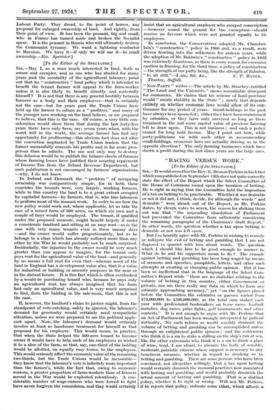[To the Editor of the SPECTATOR.] SIR,—May I, as a
man much interested in land, both as owner and occupier, and as one who has studied for many years past the mentality of the agricultural labourer, point out that no "constructive " land policy which is intended to benefit the tenant farmer will appeal to the farm-worker unless it is also likely to benefit -directly and materially himself ? It is not that there is any general hostility between farmers as a body and their employees—that is certainly not the vase—but for years past the Trade Unions have held up the farmer to odium as a " profiteer," and many of the younger men working on the land believe, or are prepared to believe, that this is the case. Of course, a very little con- sideration would show them that during the last forty-five years there have only been, say, seven years when, with the worst will in the world, the average farmer has had any opportunity for profiteering—this obvious fact does not alter the conviction implanted by Trade Union leaders that the farmer successfully conceals his profits and is far more pros- perous than he admits. The one and only way to destroy this delusion would be to publish the balance-sheets of farmers whose farming losses have justified their securing repayment of Income Tax from the Inland Revenue Department, but such publication is not encouraged by farmers' organizations —why, I do not know.
In Ireland and Denmark the " problem." of occupying ownership was comparatively simple, for in both these countries the tenants were, very largely, working farmers, while in this country the land is to a great extent occupied by capitalist farmers—by farmers, that is, who hire labourers to perform most of the manual work. In order to see how the new policy would work out, where applicable, let us take the case, of a mixed farm of 300 acres, on which six men and a couple -of boys would be employed. The tenant, if qualified under the proposed measure, might benefit largely if under a considerate landlord and sitting at an easy rent—as is the case with very many tenants even in these uneasy days —and the owner would suffer proportionately, but as he belongs to a class which has already suffered more than any other by the War he would probably not be much surprised. Incidentally, the injustice to the owner would be very much greater than you appear to imagine, for the tenant only pays rent for the agricultural value of the land—and generally by no means a full rent for even that—whereas most of the land in England has a development value also, that is a value for industrial or building or •amenity purposes in the near or in the distantfuture. It is this fact which is often overlooked by a would-be purchasing tenant who, because he pays only an agricultural rent, has always imagined that his farm had only an agricultural value, and is very much surprised to find, from the bidding in the sale-room, that this is not the case.
If, however, the landlord's claim to justice might, from the standpoint of vote-catching, safely be ignored, the labourer's demand for generosity would certainly need sympathetic attention, unless we were prepared to see the political apple- cart upset. Now, the labourer's demand• would certainly involve at least as handsome treatment for himself as that proposed for his employer. This 'would mean, in practice, 'that when the State •helped the 300-acre tenant to become owner it would have to help such of his employees as wished it to a slice of the farm, so that, say, one-third of the holding would be allotted, on equally easy terms, to the employees. This would seriously affect the economic value of the remaining two-thirds, but the Trade Unions would be inexorable— they know that the labourer's vote is infinitely more important than the farmer's, while the fact that, owing to economic reasons, a greater proportion of farm-workers than of farmers served in the War would be exploited relentlessly. A con- siderable number of wage-earners who were forced to fight have -never forgiven the compulsion, and they would certainly insist that an agricultural employer who escaped conscription —however sound the ground for the exemption—should receive no favours which were not granted equally to hit employees.
In conclusion, the Conservatives adopted Mr. Chamber- lain's " constructive " policy in 1906 and, as a result, were driven howling into the wilderness for sixteen years, while the adoption of Mr. Baldwin's " constructive " policy in 1923 was extremely disastrous, so there is every reason for excessive caution in framing, for the third time, a policy of construction —the strength of our party-being, like the strength of Zabulon, " to sit still."—I am, Sir, &c., C. F. RYDER. Thurlou:,, Suffolk.
" Nox-PARTY " writes :—The article by Mr. Strachey, entitled " The Land and the Unionists," shows remarkable disregard for economics. He claims that his scheme of land-purchase would "create stability in the State " ; surely that depends entirely on whether economic laws would allow of its con- tinuance for any period of years. Small-holdings in the past have always been spoon-fed ; either they have been maintained by subsidies, or they have only survived so long as there remained in the soil some capital value of previous fanning left to draw upon. This is not business ; and such a policy cannot for long hold favour. May I point out how, while party-politicians vie with each other in recommending small-holdings, economic laws are actually driving us in the opposite direction ? The only farming businesses which have shown a profit during the last three years are the large ones.






































 Previous page
Previous page